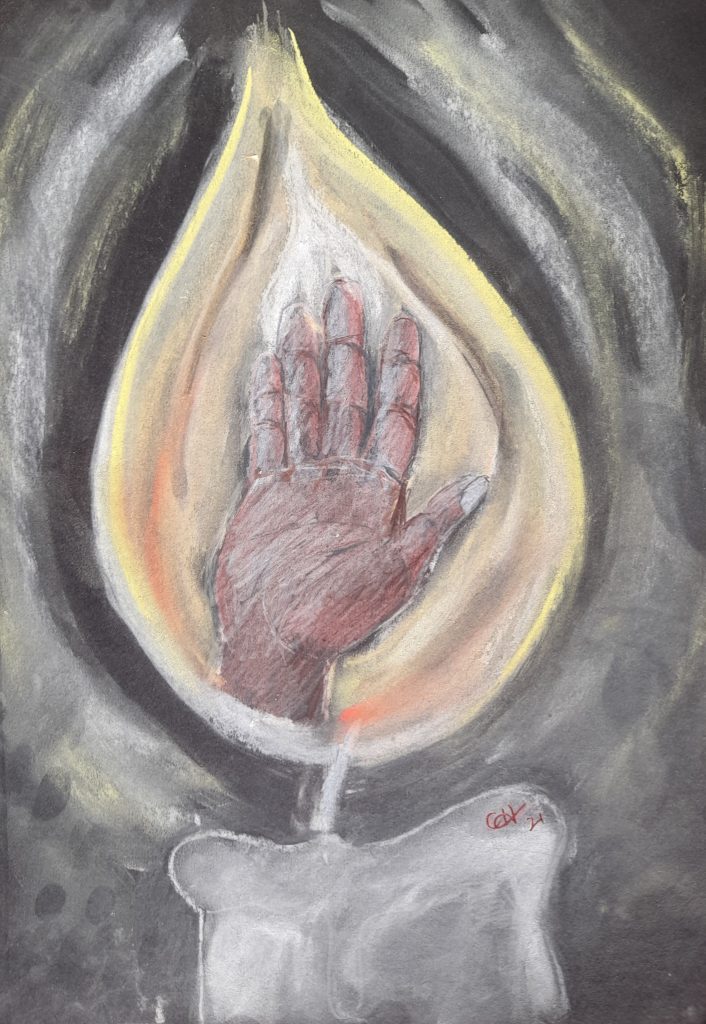We are delighted to have Karenza Mahtani write a series of Advent reflections for us over the next few weeks. Karenza is part of the Accessible Prophecy UK team. Art work is by Carolyn Higgins, another member of the team.
Advent can often be simply a time to prepare for Christmas – buying too much food, writing cards, agonising over which present to buy that person who has everything. Each year it can pass us by without recognition, except by way of tiny open doors and hidden chocolate. However, Advent is a key point in the church calendar. It offers us all a vital time to pause and to reflect as we await the celebration day of the birth of Jesus. It is summed up in the Latin root of Advent – advenire – meaning ‘to come’. But Advent also shows us that we don’t need to race to December 25th. Instead, we are offered a profound time where we hope for, lament, wrestle, prepare, rejoice and thank God for sending us Jesus and we long for his return.
Over these Advent weeks, we will be following a similar pattern to the traditional Advent wreath – 5 candles, 5 opportunities to reflect on different parts of the story. What each of these candles represents tends to vary across theological and ecclesiastical traditions, but each representation offers a fresh moment to pause and connect with God. I encourage you to take these moments as we move through this season.
Advent Reflection 1: Great is Your Faithfulness!
“In the beginning was the Word, and the Word was with God, and the Word was God. He was with God in the beginning. All things were created through him, and apart from him not one thing was created that has been created. In him was life, and that life was the light of men. The light shines in the darkness, and yet the darkness did not overcome it.” John 1 v 1-5

Our season of Advent usually lasts around four weeks. However, when we understand the breadth of time that Advent truly represents, we begin to see that the whole of history leading up to the birth of Jesus was advent – a story waiting for the main character to arrive. From the very beginning, we see that Jesus resides above and within the fabric of creation, as we read in this famous passage from John 1. Moreover, as this week often is given to represent the Patriarchs and the promises made to those who went before Jesus, we see that Jesus has always been the plan – even as far back as Genesis 3, where God curses the serpent by declaring there will be “hostility… between your offspring and her offspring. He will strike your head, and you will strike his heel” (v 15). This moment sets up the rest of the story of God’s redeeming work towards mankind. Jesus is promised, as one who will crush the Enemy, defeat sin and return mankind to perfect relationship with God, as it was intended.
Moreover, as the story proceeds, God continues to promise the revelation of Jesus to specific individuals along the way. Maybe take some time to read through these stories of promises today. To Abraham, he promises that through his offspring, all the nations of the earth will be blessed (Genesis 12 v 3 & Genesis 22 v 18), a promise that is repeated as Isaac is born. To Jacob, this promise continues through Balaam’s Third Oracle: “I see him, but not now: I perceive him, but not near. A star will come from Jacob, and a sceptre will arise from Israel” (Numbers 24 v 17). Similarly, Jacob continues these promises to Judah in his last words, when he says “The sceptre will not depart from Judah or the staff from between his feet until he whose right it is comes and the obedience of the peoples belongs to him” (Genesis 49 v 10). Later on, we see the continuation of this when Nathan prophesies to David: “When your time comes and you rest with your fathers, I will raise up after you your descendant…and I will establish his kingdom. He is the one who will build a house for my name, and I will establish the throne of his kingdom forever” (2 Samuel 7 v 12 -13).
In this way, throughout the Old Testament, God continues to reveal his plan to redeem mankind and promises various individuals that it is through their family that he will bring about his Kingdom and the restoration of all things. This is reflected in the Antiphon – O Radix Jesse: “O Root of Jesse, standing as a sign among the peoples, before you kings will shut their mouths, to you the nations will make their prayer: Come and deliver us, and delay no longer.” Each generation held onto the promise God had made, passing it down to those that came after despite not seeing its fulfilment. However, we also see through both the Genealogy of Jesus in Matthew 1, written for a Jewish audience who were familiar with the promises to the Patriarchs, but also further back into Genesis 11 and 5, that not only does God fulfil his promises to these specific individuals – Abraham, Isaac, Jacob and David – but that he also bestows honour and brings redemption. For example, Ruth, a foreign woman who refused to desert her mother-in-law when disaster struck, is honoured as the one who gave birth to Obed, father of Jesse, father to David. Moreover, we see in this genealogy that Jesus is descended from the line of Tamar who – as we read in Genesis 38 – was the daughter-in-law of Judah, yet was impregnated by him and subsequently gave birth to Perez (an ancestor of Jesus). Similarly, usually connected with David’s great sins of adultery and murder (2 Samuel 11), Bathsheba also receives mention within the genealogy, not only as the mother of Solomon, but also as the wife of Uriah – her rightful husband. Despite the sins of David, God still uses his descendent born of Bathsheba, to redeem not just the whole world, but also to a certain extent the misdeeds of his own family. Within these we see that God’s promises and faithfulness remain true regardless of the ethical or sexual purity of people’s behaviour. In this same way, we see after David, a long line of kings from whom Jesus is descended through Joseph, some of whom pleased the Lord, such as Josiah, many of whom failed and led the people of God astray to great destruction.
Despite all of this, the promises of God hold true. No matter the sin – individual and collective – or the background or circumstances of those involved in Jesus’ family history, God still works through this to redeem and restore mankind, but also those who came before him. Whilst on the one hand, the actions of many within this genealogy would seem utterly disqualifying, all of them are given a clear mention in being part of fulfilling the promises of God through the birth of Jesus.
As we begin Advent this week, take some time to reflect on some of the promises God has made to you. Maybe make a physical list or simply ask God to bring them to mind. Use the song below or the image to help you focus and process some of the things that God raises with you during this time. Be encouraged that God works through hundreds of years and some of the worst evil that humanity can produce and still brings promises to fulfilment. Allow yourself to rest in the promise in Isaiah 55 that God’s words do not return to him empty – they are fulfilled, even if this happens on a different time scale, in a different way or through surprising people or circumstances, beyond what we were expecting. Moreover, ask God for fresh hope and faith to pray these promises to fulfilment, and for the eyes to see where he is already moving in your life and the lives of those around you. Or you could spend some time looking through the promises God makes and fulfils across the Bible to various people, as we have done briefly above. Thank him for his faithfulness and goodness to us, despite the ways that we often fall short and forget what he has done before.
I pray that in this first week of Advent, you would be blessed by the testimony of the Patriarchs and by the God who keeps his promises.

